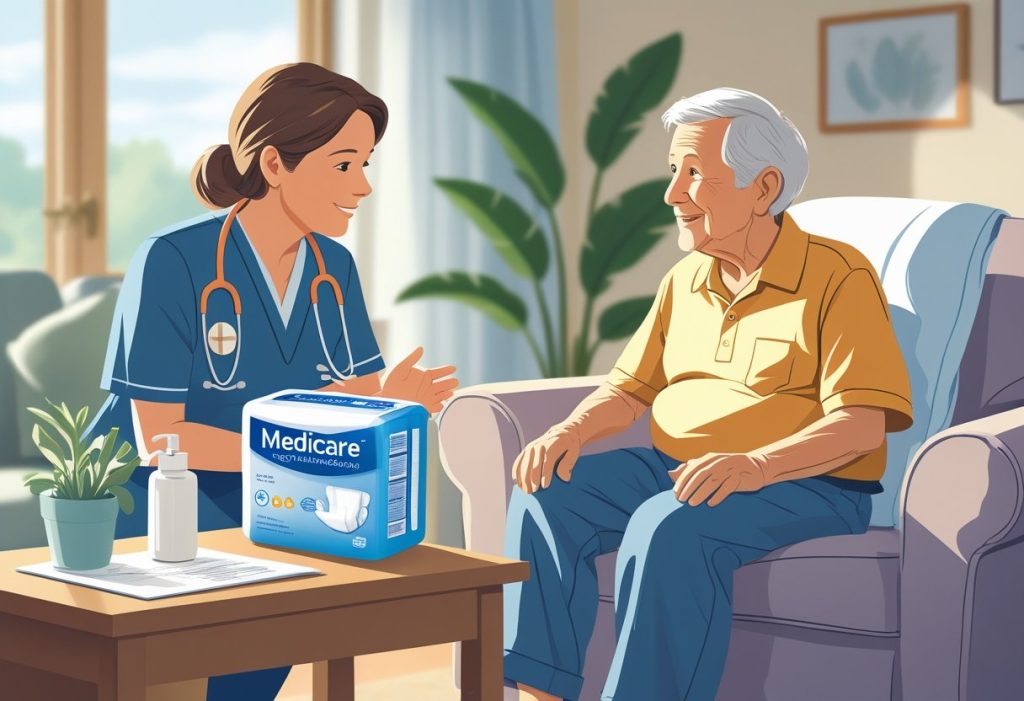Navigating Medicare options can be challenging, especially when it comes to understanding your coverage for specific needs like incontinence supplies. Adult diapers and similar incontinence products are generally not covered by Medicare, which can leave many individuals searching for alternative solutions. It’s crucial to be informed about what Medicare will and will not cover to manage these health needs effectively.
Choosing the right Medicare plan can significantly impact your financial situation and quality of life. At The Modern Medicare Agency, our licensed agents are dedicated to helping you identify Medicare packages that suit your specific needs, without any hidden fees. You’ll benefit from personalized, one-on-one consultations, ensuring you have all the information necessary to make the best decision for your healthcare.
Stay informed and empowered as you explore your options. Understanding the limitations of Medicare coverage allows you to seek additional assistance if needed, whether through other insurance plans or community resources. With the right support, you can effectively manage your health care needs without unnecessary stress.
Does Medicare Cover Adult Diapers?
When considering Medicare coverage for adult diapers, it’s essential to understand the distinctions between Original Medicare and Medicare Advantage plans. Coverage can vary significantly, impacting how much you pay out-of-pocket for incontinence supplies.
Original Medicare Coverage for Incontinence Supplies
Original Medicare, which includes Part A and Part B, generally does not cover adult diapers. These items are classified as disposable personal hygiene products rather than durable medical equipment, thus falling outside of Medicare’s coverage criteria.
If you are in a long-term care facility, there may be exceptions, as some facilities include these supplies as part of their services. However, for individuals receiving care at home, Medicare does not provide reimbursement for adult diapers. This limitation can lead to significant out-of-pocket costs for those managing incontinence.
Medicare Advantage Plans and Supplemental Benefits
Medicare Advantage plans, also known as Medicare Part C, often offer additional benefits that Original Medicare does not. Some Advantage plans may include coverage for adult diapers, allowing for reimbursement for over-the-counter incontinence supplies.
The specifics depend on the individual plan, so it’s vital to review the details of your policy. Coverage may come with certain requirements, such as copayments or deductibles. Therefore, carefully evaluating your plan can help you make the most informed decisions regarding incontinence care.
Eligibility Criteria for Coverage
For any Medicare coverage, eligibility is contingent on several factors. To qualify for assistance with adult diapers through Medicare Advantage, you typically must be enrolled in a plan that explicitly states coverage for incontinence supplies.
You may also need to provide documentation from your healthcare provider confirming the medical necessity of these items. Understanding your plan’s eligibility criteria is crucial in avoiding unexpected costs, making sure that your needs align with the services provided.
Common Misconceptions About Medicare and Adult Diapers
There are frequent misunderstandings regarding Medicare’s coverage of adult diapers. One common belief is that all incontinence supplies are covered under any Medicare plan, which is inaccurate.
Many people assume that since these products are essential for managing health, they should be included. However, Medicare categorizes adult diapers under personal hygiene, thereby excluding them from coverage.
Staying informed about these nuances is essential for managing your healthcare expenses effectively. To navigate these complexities better, consider reaching out to The Modern Medicare Agency. Our licensed agents provide one-on-one consultations to identify Medicare packages tailored to your specific needs without incurring unnecessary costs.
Types of Incontinence and Related Supplies
Incontinence can take various forms, affecting daily life in multiple ways. Understanding the specific types of incontinence and the supplies related to each can help you make informed choices.
Urinary Incontinence and Stress Incontinence
Urinary incontinence is a prevalent condition characterized by the involuntary loss of urine. This may occur due to different reasons, including weakened bladder muscles or neurological disorders.
Stress incontinence is one common type, typically caused by physical activity, coughing, or sneezing. It happens when pressure is placed on the bladder, leading to leakage.
To manage this condition effectively, many individuals use bladder control pads and adult diapers. These products provide discreet protection and comfort for those experiencing leakage during daily activities.
Overflow and Functional Incontinence
Overflow incontinence occurs when the bladder does not empty completely, leading to frequent leakage. This can result from an obstruction or weak bladder muscles. Individuals may notice constant dribbling or an inability to fully control their urine flow.
Functional incontinence happens when physical or mental impairments hinder timely access to the toilet. Conditions like arthritis or dementia can contribute to this issue.
For both types, using catheters may be necessary for better management. These devices assist in proper urine drainage and help maintain hygiene.
Overview of Incontinence Supplies
A variety of incontinence supplies are available to address different levels of need. Options include:
- Adult diapers: Designed for heavier absorption, catering to those with severe incontinence.
- Bladder control pads: Suitable for lighter leakage, these pads can be worn discreetly in regular underwear.
- Catheters: Used primarily for overflow incontinence, assisting with urine drainage when needed.
Your choice of supplies will depend on the type of incontinence and personal comfort levels. Consulting with experts from The Modern Medicare Agency can help you find the best options tailored to your needs. Our licensed agents work closely with you to ensure that your Medicare packages meet your specifications without unnecessary fees.
Understanding Medicare’s Durable Medical Equipment Policy
Medicare’s policy on Durable Medical Equipment (DME) is crucial for understanding what items are covered under different circumstances. DME encompasses essential medical supplies that assist with health conditions, while some items you may need for everyday care are not included. This section will clarify what qualifies as DME, which urological supplies are covered, and how DME differs from disposable incontinence supplies.
What Qualifies as Durable Medical Equipment (DME)
Durable Medical Equipment includes items that can withstand repeated use and are primarily for medical purposes. Under Medicare Part B, DME must be prescribed by a healthcare provider and used for your medical condition. Examples include:
- Wheelchairs
- Walkers
- Canes
- Catheters
These items help improve your mobility or manage your health needs effectively. To be covered, the equipment must be necessary and appropriate for your treatment plan, rather than merely for convenience.
Urological Supplies Covered by Medicare
Medicare does cover specific urological supplies under the DME provision. This includes equipment like catheters, which are essential for managing urinary incontinence issues. The coverage is applicable when these items are considered medically necessary and prescribed by your healthcare provider.
However, items like adult diapers and absorbent pads are not covered because they are deemed personal convenience supplies. It’s important to consult with your provider regarding the specific items that can be included in your Medicare plan to manage your urological needs effectively.
Distinction Between DME and Disposable Supplies
It’s crucial to distinguish between Durable Medical Equipment and disposable supplies. DME consists of items for long-term use that require a prescription, while disposable supplies are intended for single-use or close to it.
For example, while catheters are covered as DME, adult diapers are not included because they are considered merely practical for daily living rather than medical necessities. Understanding this distinction can help you navigate Medicare policies better and identify what types of supplies may be eligible for coverage.
Choosing a trusted resource for your Medicare needs is vital. At The Modern Medicare Agency, our licensed agents provide personalized assistance to identify Medicare packages that match your specifications, ensuring you receive the support you need without hidden fees.
Alternative Sources of Coverage for Adult Diapers
While Medicare does not provide coverage for adult diapers, several alternative options may help you manage the costs associated with these essential items. Exploring Medicaid programs, community assistance, and state-specific aid can provide viable solutions for your needs.
Coverage Under Medicaid Programs
If you qualify for Medicaid, you may find coverage for adult diapers through certain state programs. Medicaid often provides assistance for incontinence supplies as part of broader healthcare services. This support typically varies by state, so it’s essential to check with your local Medicaid office.
Some plans may cover specific brands or require prior authorization. Remember to keep all documentation related to your medical needs to streamline the process. This added layer of support can significantly ease financial burdens.
Community and Nonprofit Assistance
Numerous community organizations and nonprofits offer assistance with purchasing adult diapers. These programs may provide supplies directly or offer financial aid to help cover costs. Senior centers, religious organizations, and local charities often have resources available.
Check with your local Area Agency on Aging or community health center for information about available services. These organizations can connect you with programs focused on incontinence support and other related needs.
State-Specific Aid and Dual-Eligible Plans
Certain states offer specific programs designed for seniors, particularly those dual-eligible for both Medicare and Medicaid. These plans often include additional benefits that can cover incontinence supplies. Enrolling in a Dual-Eligible Special Needs Plan (D-SNP) may enhance your coverage options.
You should evaluate the different plans available in your state through resources like The Modern Medicare Agency. Our licensed agents can guide you to find packages that fit your needs without unpredictable costs. We provide personalized assistance, ensuring that you receive the best options available.
Costs, Savings, and Practical Solutions
Navigating the costs associated with incontinence supplies, particularly adult diapers, can be challenging with Medicare coverage. Understanding out-of-pocket expenses and exploring cost-saving options is essential for managing your budget effectively.
Out-of-Pocket Expenses With Medicare
Medicare generally does not cover adult diapers or any incontinence supplies. This means you’ll face 100% of the costs, which can add up quickly. While Original Medicare has set deductibles and may require coinsurance or copayments for certain medical services, these do not extend to supplies for incontinence.
Without coverage, be prepared for ongoing expenses. For instance, the average price of a pack of adult diapers ranges from $15 to $40, depending on the brand and quantity. You need to consider your usage rate to estimate monthly costs accurately.
Understanding this financial burden upfront allows you to budget effectively. Working with a knowledgeable agent from The Modern Medicare Agency can help you find affordable alternatives that fit your needs.
Discount Programs and Bulk Purchasing
Finding ways to reduce costs is crucial. Some retailers offer discount programs for incontinence products. These programs can significantly reduce your expenses, especially if you purchase in bulk.
Consider purchasing directly from manufacturers or joining subscription services that offer discounts for recurring shipments. Many online platforms provide bulk purchasing options, leading to lower per-unit costs.
Additionally, keeping an eye out for seasonal sales can be beneficial. Many retailers have sales events, especially during holiday periods. Taking advantage of such offers can provide considerable savings over time.
Tips for Affording Incontinence Supplies
Affording incontinence supplies can become manageable with the right strategies. Start by comparing prices at various retailers, both online and in-store, to ensure you get the best deal. Using coupons can also help reduce overall expenses.
Consider exploring health savings accounts (HSAs) or flexible spending accounts (FSAs). These accounts allow you to set aside pre-tax dollars specifically for medical expenses, including incontinence supplies.
Moreover, discuss your needs with your healthcare provider. They might recommend alternative products that are more cost-effective.
For personalized guidance, consult with The Modern Medicare Agency. Their licensed agents are ready to help you navigate your Medicare options without hidden fees.
Frequently Asked Questions
This section addresses common inquiries about the coverage of adult diapers and incontinence supplies through Medicare and related programs. You can find specific information on how to obtain these supplies and the options available to ease costs.
How can seniors obtain incontinence supplies through Medicare?
Seniors can typically obtain incontinence supplies through Medicare by enrolling in a Medicare Advantage plan that offers additional benefits. Original Medicare does not cover adult diapers, so exploring Medicare Advantage options is essential for coverage.
What options are available for free incontinence supplies for the elderly?
Free incontinence supplies may be obtained through community organizations or local health departments. Some non-profits and charitable organizations also provide assistance in securing these products at no cost to seniors.
Does Medicare Part B provide any coverage for incontinence products?
Medicare Part B generally does not cover adult diapers and similar incontinence products. The focus of Part B is on medically necessary supplies and services, which typically do not include items considered to be for personal hygiene.
Are incontinence supplies covered under Medicare Advantage plans?
Medicare Advantage plans may offer coverage for incontinence supplies, including adult diapers. The extent of coverage varies by plan, so it’s crucial to review the details of each plan to understand what is available.
What assistance programs are available for the cost of adult diapers?
Various assistance programs are available to help with the cost of adult diapers. These may include state Medicaid programs or local non-profit organizations that provide financial support or supplies for eligible seniors.
Can Medicaid beneficiaries receive coverage for adult incontinence supplies?
Medicaid beneficiaries may receive coverage for adult incontinence supplies, depending on the state and specific Medicaid program. Each state has its regulations, so checking with local Medicaid offices for detailed information is advisable.
Choosing The Modern Medicare Agency ensures that you have access to knowledgeable agents who can help you navigate your Medicare options. Our agents provide personalized assistance in finding the right Medicare plans tailored to your needs without any unexpected fees.






